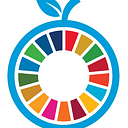Innovations in Financing scaling up Agroecology — example of A.P Community-managed Natural Farming, Government of Andhra Pradesh, India
By Vijay Kumar, Executive Vice-Chairman of the Rythu Sadhikara Samstha and UNFSS Champion
The Rythu Sadhikara Samstha (RySS) (Farmers’ Empowerment Corporation), Government of Andhra Pradesh (GoAP), India is implementing, since 2016, a statewide agroecology programme called “A.P Community-managed Natural Farming”. This transformative solution comprises of the universal principles of agroecology and local, traditional and context-specific practices. To date, the programme has reached 1.05 million farmers and farmworkers across 3730 villages, with a vision to enrol all 6 million farmers and farmworkers and cover all the crops by 2027, and complete the transformation by 2030.
The cost of transformation to agroecology from conventional synthetic chemicals-based agriculture is for knowledge dissemination, handholding farmers and for supporting women’s collectives taking lead in this process. There are no cash subsidies to farmers. The impressive scaling up is due to the results achieved on ground by innovative farmers, the social capital of rural women collectives, knowledge dissemination through champion farmers and the long-term support by government and civil society organisations. The cost of transformation per farm family is $215 over 7 years.
GoAP is financing this programme with its own resources and has allocated a budget of $255 million for the first phase covering 1 million farmers. However, for scaling and to cover the entire State, the estimated investment is $1.4 billion over the next 10 years.
This is one of the investments with the highest returns — direct benefits, intangible benefits and gains to government from avoided subsidies.
Our studies indicate four kinds of benefits:
- Direct benefits to farmers: Conservative estimate shows additional income of $15 billion over next 10 years, including saving $5 billion by avoiding synthetic chemicals;
- Intangible benefits to citizens and the ecosystem; this needs to be quantified through instruments like true cost accounting;
- Savings for government, banks and insurance companies from better resilience to floods, cyclones and droughts; this has not yet been quantified;
- Avoided subsidies: Savings of $4.9 billion in fertiliser subsidy over 10 years. Studies have also shown savings of 30–40% in water usage and electricity used for irrigation — resulting in a saving of $2.4 billion over 10 years.
Thus a $1.4 billion investment in transformation results in saving $7.3 billion in avoided subsidies. Governments and financial institutions should seriously consider this financing mechanism. There is also a strong case for an accounting mechanism to quantify the intangible benefits of ecosystem services.
About the Author: T. Vijay Kumar is the Executive Vice-Chairman of the Rythu Sadhikara Samstha (Farmers’ Empowerment Corporation), Government of Andhra Pradesh (GoAP), India , and Ex Officio Spl Chief Secretary to Government (Natural Farming) Agriculture and Cooperation Department of the Government of Andra Pradesh. Kumar is also a UN Food Systems Summit Champion — find out more.
The views and opinions expressed in this blog are those of the author and do not necessarily reflect the official policy or position of the United Nations Food Systems Summit.
